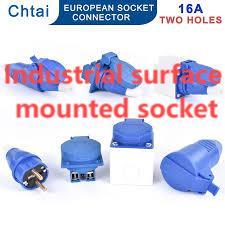-
Noticias Feed
- EXPLORE
-
Blogs
-
Marketplace
Choosing Nante Industrial Surface Mounted Socket Solutions for Harsh Environments

In industrial electrical design, choosing the right connector can save hours of maintenance and prevent costly downtime. A well-specified Industrial surface mounted socket placed at reachable locations simplifies machinery hookups and routine servicing, while a correctly chosen Industrial surface mounted socket minimizes cable lengths and trip hazards. Nante recommends assessing environment, load, and accessibility early in project planning to ensure the selected device meets both operational and safety targets.
Why Surface-Mounting Makes Sense
Surface-mounted units offer obvious advantages for retrofit projects or sites where flush recesses are impractical. They allow quick access for inspections and replacement, reduce structural modifications, and can be installed on machinery frames, mezzanines, or control cabinets. For facilities with frequent layout changes, surface-mounted outlets make reconfiguration faster and less disruptive.
Environmental Ratings and Material Choices
Selecting the correct ingress protection and housing material is critical. Look for IP66 or IP67 ratings if washdowns or temporary immersion are possible. Polycarbonate or glass-reinforced polyester enclosures resist impact and corrosion, whereas stainless-steel faceplates may be preferred in highly abrasive or chemical environments. Gasket materials and fastener finishes should be compatible with local atmospheres to avoid premature failure.
Electrical Performance and Compliance
Specify current and voltage ratings with appropriate margin for startup inrush and transient events. Industrial sockets often handle higher duty cycles than domestic devices, so verify contact material, finger-proof barriers, and thermal limits. Compliance with IEC, UL, or regional standards simplifies approvals and ensures reproducible performance across installations. Consider integrated earthing options and IP-rated covers with locking features where tamper resistance is needed.
Accessories, Compatibility, and Vendor Ecosystems (Featuring Schneider Electric)
Accessory ecosystems speed integration. Vendor kits that include gland plates, mounting brackets, and DIN-rail adaptors simplify procurement and installation. Established manufacturers such as Schneider Electric provide tested accessory sets and documentation, reducing design risk. When choosing components, confirm spare-part availability and cross-compatibility to avoid costly custom adaptations during future maintenance.
Installation Best Practices and Mechanical Considerations
Mount on flat, prepared surfaces and use recommended torque values to prevent housing stress. Orient cable entries so water drains away from critical connections and ensure strain relief prevents mechanical load transfer to terminations. Label outlets clearly with circuit IDs and voltage classes to aid troubleshooting. Where vibration is present, use anti-vibration mounts or reinforced bosses and inspect torque settings periodically.
Testing, Commissioning, and Routine Inspection
Before commissioning, perform contact-resistance checks and insulation testing, and verify that covers and latches operate reliably. Thermal imaging during initial load runs can reveal hotspots before they cause problems. Schedule periodic inspections of seals, fasteners, and contact integrity as part of preventive maintenance, especially in corrosive or high-humidity settings.
Lifecycle Management and Upgrade Planning
Plan for the long term by documenting installed models, accessory part numbers, and typical failure modes. Keep a modest stock of common spares—gaskets, fasteners, and contact modules—to shorten repair windows. When considering upgrades, evaluate whether newer models offer improved sealing systems, easier mounting, or better accessory compatibility to reduce lifecycle costs.
Practical Applications and Case Scenarios
Surface-mounted sockets are frequently used on conveyor lines for tool power, at loading docks for temporary equipment, and on outdoor kiosks for lighting and temporary power. In food-processing plants, IP66-rated units with sanitary-friendly housings enable safe washdowns. Logistics centers benefit from ruggedized outlets in charging bays for mobile equipment, where rapid access and secure mounting are priorities.
Final Recommendations for Specifiers
Match electrical ratings and IP class to the harshest expected condition, prioritize vendors with clear accessory ecosystems, and adopt a maintenance schedule that includes physical and thermal inspections. Thoughtful selection and installation reduce downtime, enhance safety, and lower total cost of ownership. For detailed product specifications, accessories, and ordering information, visit www.nante.com/product/
- Art
- Crafts
- Drinks
- Fitness
- Food
- Juegos
- Health
- Home
- Literature
- Music
- Networking
- Finance
- Other
- Hotels
- Shopping
- Sports
- Wellness


